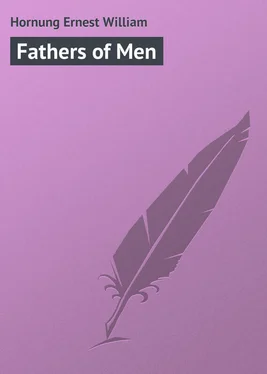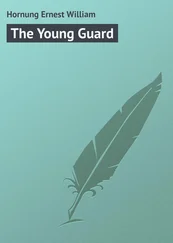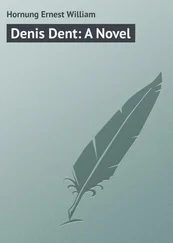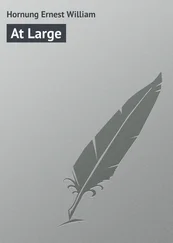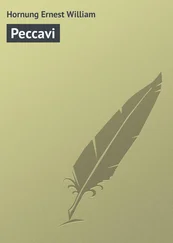Ernest Hornung - Fathers of Men
Здесь есть возможность читать онлайн «Ernest Hornung - Fathers of Men» — ознакомительный отрывок электронной книги совершенно бесплатно, а после прочтения отрывка купить полную версию. В некоторых случаях можно слушать аудио, скачать через торрент в формате fb2 и присутствует краткое содержание. Жанр: foreign_prose, на английском языке. Описание произведения, (предисловие) а так же отзывы посетителей доступны на портале библиотеки ЛибКат.
- Название:Fathers of Men
- Автор:
- Жанр:
- Год:неизвестен
- ISBN:нет данных
- Рейтинг книги:5 / 5. Голосов: 1
-
Избранное:Добавить в избранное
- Отзывы:
-
Ваша оценка:
- 100
- 1
- 2
- 3
- 4
- 5
Fathers of Men: краткое содержание, описание и аннотация
Предлагаем к чтению аннотацию, описание, краткое содержание или предисловие (зависит от того, что написал сам автор книги «Fathers of Men»). Если вы не нашли необходимую информацию о книге — напишите в комментариях, мы постараемся отыскать её.
Fathers of Men — читать онлайн ознакомительный отрывок
Ниже представлен текст книги, разбитый по страницам. Система сохранения места последней прочитанной страницы, позволяет с удобством читать онлайн бесплатно книгу «Fathers of Men», без необходимости каждый раз заново искать на чём Вы остановились. Поставьте закладку, и сможете в любой момент перейти на страницу, на которой закончили чтение.
Интервал:
Закладка:
The day was fully occupied with the rather exhaustive examination designed to put the right boy in the right form. There were no fewer than three papers in the morning alone. There was, however, a short break between each, which Carpenter was inclined to spend in boring Rutter with appreciative comments upon the striking mural decorations of the great schoolroom in which the examination was held. There were forty-two new boys, some of them hulking fellows of fifteen or more, some quite small boys in Eton jackets; and the chances are that none among them was more impressed than Carpenter by the reproductions of classical statuary hung upon the walls of Pompeian red, or by the frieze of ancient and modern authors which a great mind had planned and a cunning hand had made; but it is certain that none thought less of them than Jan Rutter. To pacify his companion he did have a look at the frieze, but it was exactly the same look as he had cast into the studies before breakfast. The two had more in common when they compared notes on the various papers.
“I didn’t mind the Latin grammar and history,” said Jan. “I’ve had my nose in my grammar for the last six months, and you only had to answer half the history questions.”
Jan’s spirits seemed quite high.
“But what about the unseen?” asked Carpenter.
“I happened to have done the hardest bit before,” said Jan, chuckling consumedly; “and not so long since, either!”
Carpenter looked at him.
“Then it wasn’t unseen at all?”
“Not to me.”
“You didn’t think of saying so on your paper?”
“Not I! It’s their look-out, not mine,” chuckled Jan.
The other made no comment. It was the long break in the middle of the day, and the pair were on their way back to Heriot’s for dinner.
“I wish they’d set us some verses,” said Carpenter. “They’d be my best chance.”
“Then you’re a fool if you take it,” put in a good-humoured lout who had joined them in the street.
“But it’s the only thing I can do at all decently,” explained the ingenuous Carpenter. “I’m a backward sort of ass at most things, but I rather like Latin verses.”
“Well, you’re another sort of ass if you do your best in any of these piffling papers.”
“I see! You mean to make sure of a nice easy form?”
“Rather!”
“There’s no fagging over the Upper Fourth, let me tell you, even for us.”
“Perhaps not, but there’s more kinds of fagging than one, you take my word for it; and I prefer to do mine out of school,” said the big new boy, significantly, as their ways parted.
Carpenter wanted to discuss his meaning, but Jan took no interest in it, and was evidently not to be led into any discussion against his will. He had in fact a gift of silence remarkable in a boy and not a little irritating to a companion. Yet he broke it again to the extent of asking Heriot at table, and that à propos of nothing, when the other boys would “start to arrive.”
“The tap will be turned on any minute now,” said Heriot, with a look at his sister. “In some houses I expect it’s running already.”
“Which house is Devereux in?” asked Rutter, always direct when he spoke at all.
“Let me think. I know – the Lodge – the house opposite the chapel with the study doors opening into the quad.”
Carpenter’s silence was the companion feature of this meal.
The boys had time for a short walk afterwards, and more than a hint to take one. But they only went together because they were thrown together; these two had obviously as little else in common as boys could have; and yet, there was something else, and neither dreamt what a bond it was to be.
“Do you know Devereux?” Carpenter began before they were out of their quad.
“Why? Do you know him?”
Jan was not unduly taken aback; he was prepared for anything with regard to Devereux, including the next question long before it came.
“We were at the same preparatory school, and great pals there,” replied Carpenter, wistfully. “I suppose you know him at home?”
“I used to, but only in a sort of way,” said Jan, warily. “I don’t suppose we shall see anything of each other here; he mayn’t even recognise me, to start with.”
“Or me, for that matter!” cried Carpenter, with less reserve. “He’s never written to me since we left, though I wrote to him twice last term, and once in the holidays to ask him something.”
It was on the tip of Jan’s tongue to defend the absent Evan with injudicious warmth; but he remembered what he had just said, and held his tongue as he always could. Carpenter, on the other hand, apparently regretting his little show of pique, changed the subject with ingenuous haste and chattered more freely than ever about the various school buildings that they passed upon their way. There was a house at the end of the street with no fewer than three tiers of ivy-covered study windows; but it had no quad. There were other houses tucked more out of sight; but Carpenter knew about them, and which hero of the Cambridge eleven had been at this, that, or the other. His interest in his school was of the romantic and imaginative order; it contrasted very favourably with Jan’s indifference, which grew the more perversely pronounced as his companion waxed enthusiastic. It appeared that Carpenter was following a number of youths from his part of the world, who had been through the school before him, and from whom he had acquired a smattering of its lore. The best houses of all, he had heard, were not in the town at all, but on the hill a quarter of a mile away. The pair went to inspect, and found regular mansions standing back in their own grounds, their studies and fives-courts hidden from the road; for the new boys trespassed far enough to see for themselves; and Rutter at once expressed a laconic preference for the hill houses, whereat Carpenter stood up as readily for the town.
“There’s no end of rivalry between the two,” he explained, as they trotted down into the valley, pressed for time. “I wouldn’t be in a hill house for any money, or in any house but ours if I had my choice of all the lot.”
“And I wouldn’t be here at all,” retorted Jan, depriving his companion of what breath he had as they hurried up the hill towards the town. By turning to the left, however, in the wake of other new boys in a like hurry, they found themselves approaching the chapel and the great schoolroom by a shorter route. It led through a large square quad with study doors opening upon it down two sides, and nothing over these studies but their own roof.
“There’s plenty of time,” said Jan, with rather a furtive look at a little gold lady’s watch that he pulled out in his fist. “I wonder if this is the Lodge?”
“No – it’s the next – opposite the chapel. This is the School House. Do come on!”
The School House and the Lodge were like none of the other houses. Instead of standing by themselves in the town or on the hill, each formed a part of the distinctive group of which the chapel and the great schoolroom were the salient features. Their quadrangles not only adjoined, but there was no line of demarcation to show where one began or the other ended. In both the study doors opened straight into the fresh air; but in neither was a boy to be seen as Carpenter and Rutter caught up the flying remnant of the forty-two.
“Let’s go back by the Lodge,” said Jan, when at last they were let out for good. But now the scene was changing. Groups of two and three were dotted about in animated conversation, some still in their journey hats, others in old school caps with faded badges, but none who took the smallest notice of the new boys with the new badges, which they had still to learn to crease correctly over the peak.
Читать дальшеИнтервал:
Закладка:
Похожие книги на «Fathers of Men»
Представляем Вашему вниманию похожие книги на «Fathers of Men» списком для выбора. Мы отобрали схожую по названию и смыслу литературу в надежде предоставить читателям больше вариантов отыскать новые, интересные, ещё непрочитанные произведения.
Обсуждение, отзывы о книге «Fathers of Men» и просто собственные мнения читателей. Оставьте ваши комментарии, напишите, что Вы думаете о произведении, его смысле или главных героях. Укажите что конкретно понравилось, а что нет, и почему Вы так считаете.
